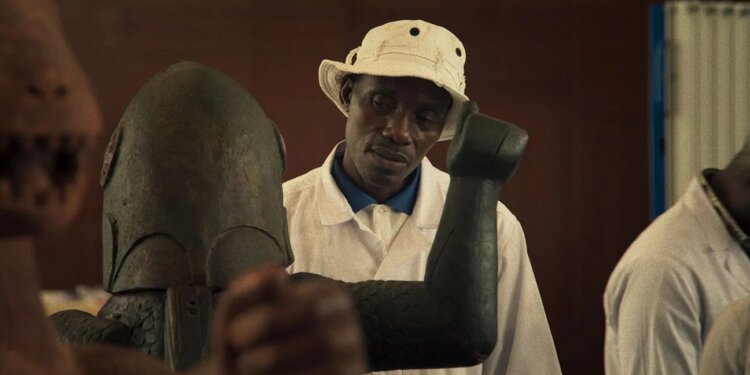The first few scenes of Dahomey unfold in a manner reminiscent of other African documentaries on the repatriation of looted artifacts. Like The Empty Grave (2024) before it, the film lingers in a pristine, white museum, where African history sits catalogued and encased – but with hauntingly poetic whispers from a spirit held within a statue. The film sets itself apart almost instantly, promising the musings of a lost history in arthouse style, yet remains restrained by the need to document realities unbridged by its fictionalised elements.
By the end, Diop crafts a slender, dreamy documentary that intimately occupies the political and poetic spaces where art, history, and post-colonial identity collide – with both unintentional and unchoreographed symmetry. The film, which won the Golden Bear prize at Berlinale 2024, bypasses traditional documentary methods, instead evolving into a hypnotic, sensorial experience that’s as much about mood and memory as it is about the facts of restitution. Relatively small in scale and production – and following her acclaimed debut feature Atlantics – Diop wields her rising auteur reputation to elevate a project that, in less capable hands, might have remained a niche academic exercise or a loud cesspool of runaway opinions.
Split into two loosely structured parts, Dahomey first bolts its audience into the journey of 26 looted Beninese artifacts being returned from France to their country of origin, as the ominous voice of one of the artifacts contemplates its state of being. After a brief interlude showing the unpacking, restoration, and ceremonial unveiling, the second half transitions into a vibrant debate among students at the University of Abomey-Calavi – spirited, articulate, and challenging in their exploration of what restitution truly means. Their perspectives span nearly every angle, from the idealism of the act to broader postmodern African views on the true meaning of decolonisation. The gesture is described as a long-overdue act of justice, a symbolic insult, and a calculated PR move by both the Beninese and French governments—articulated so precisely and so raw, it echoes sentiments shared by many Africans.
Rather than offering definitive answers, Dahomey floats in ambiguity. Diop, making full use of the documentary’s minimalist form, stirs the film’s central conversations with an ambient, meditative score that lulls the viewer into a dreamlike state. Voiceover from the returned sculpture – speaking in Fon, a local language – reflects on the warped emotions of exile, homecoming, and alienation. This anthropomorphized voice, scripted by Makenzy Orcel, muses on the meaning of return after over a century in captivity, and on the traces of itself it still sees in the descendants of its land: “Within me resonates infinity.”
The film’s greatest strength lies in its ability to collapse past and present, myth and materiality—acting less as a historical record and more as a philosophical inquiry into identity, memory, and continuity among the Beninese people through the eyes of this ancestral visitor. The camera glides with elegance through Porto-Novo, juxtaposing ritual, architecture, and daily life with moments of eerie stillness – workers painting the new museum, voices of politicians officiating the return, children among the crowds watching in awe, faces sculpted a century ago.
When the documentary settles into a roundtable discussion with Beninese students, the resulting torrent of impassioned discourse injects Dahomey with profound humanity—filled with levity, honesty, and a familiar sincerity. The students question the legitimacy of museums, lament the erasure of the artifacts’ religious and spiritual dimensions, and note the irony of having to express themselves only in French during a conversation about reclaiming their cultural identity. One student laments knowing more about Avatar than the kings of Dahomey; another wonders what good a museum is if people can’t afford three meals a day.
The film does not attempt to teach or argue – it invites contemplation, in whatever form that arises, refusing to neatly categorize its subjects as many documentaries often do. Rather than offering the comfort of didacticism – one that might resonate with the present revolutionary currents within Africa, or the ever-present compassionate pity of non-African audiences – Diop presents the tensions of post-colonial Africa as unresolved and ongoing, budding in conversations and debates that only Africans can voice among themselves.
In just 68 minutes, Dahomey stirs curiosity about the lingering echoes of African spirituality held within totems, ushers viewers into the halls and memory of Benin without overexplaining, gives voice to a diverse group of African students articulating justified, complex, and sometimes contradictory yet complementary perspectives – and ends with an ethereal, meditative appreciation for the mundanity of the present.
There isn’t much more one can ask for in an hour of existence.
Dahomey is now showing at Unseen Nairobi until 31 May.
Enjoyed this article?
To receive the latest updates from Sinema Focus directly to your inbox, subscribe now.











